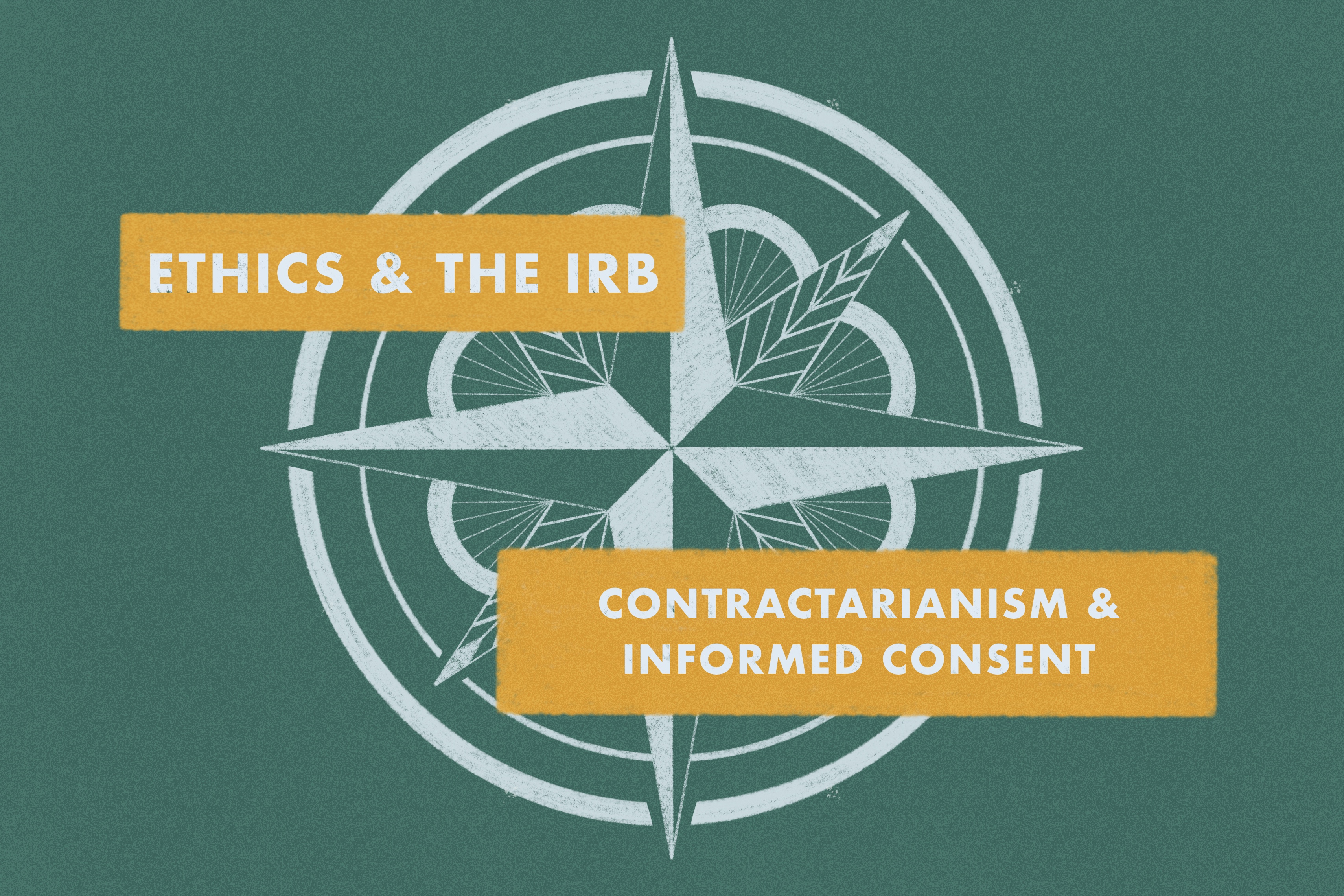One of the main tasks of the Institutional Review Board (IRB) is to ensure that the rights and welfare of participants are upheld through the responsible conduct of research. But what exactly are the “rights” of the participants? And what do we define as the “responsible conduct of research”?
A clear definition of terms allows researchers and participants to adhere to the same outlined rights and appropriate research conduct. These definitions are articulated in the IRB’s formal informed consent process, that outlines (1) the expectations of research for both the researcher and participant, (2) the rights of the participant that the researcher is bound to protect, and (3) the regulations and procedures for following a breach of that protection. This type of consent—an explicit agreement between two parties—can be compared to an agreement in Contractarianism.
Contractarianism: Trading Freedoms for Increased Benefits
Contractarianism is based on the idea that we as rational, free, self-serving individuals can, and often do, trade in some of our freedom for increased benefits and security in society. This can happen person-to-person or on a much broader scale between a person and their society. For example, if you post a public question on an open forum (e.g., stackoverflow, stackexchange), you may expect that others will give you a helpful answer to the best of their abilities. On these forums, there are often community guidelines that set expectations for amicable member interactions. By posting on the forum, you have traded in your freedom to behave as you like, and instead, abide by the community guidelines. With your adherence to the forum guidelines, you may gain the benefit of having your question answered and the security of knowing that others on the forum will treat you with similar respect.
According to contractarianism, there are two contract types:
- Explicit contracts are outlined either in verbal or written format, and agreed to by all parties involved (e.g., permission forms, signed agreements, and legal contracts).
- Implicit contracts are those contracts that individuals may not have explicitly agreed to but are still bound to follow (e.g., traffic laws, classroom rules, some social norms, etc.).
Requirements for a Valid Contract
In order for a contract to occur under Contractarianism two parameters must be met. First, all parties must be free and able to choose whether they participate in the contract. In other words, the person can not be forced into a contract. Additionally, rational parties will enter into self-beneficial contracts, not ones that hurt or harm them, so the contract should involve benefits for all parties. The second requirement is that all parties must agree to the binding terms of the contract. If one party does not agree, they should not be required to enter into the agreement and are not bound by the terms of the contract.
Informed Consent and Explicit Contracts
Based on these stipulations, the informed consent process as outlined by the federal government is an explicit agreement between two parties, the researcher and the participant. However, simply signing a paper does not guarantee that both parties are informed enough to agree to all terms of the agreement. TC IRB's sample Informed Consent Form Template for researchers outlines the full process of consent. Each informed consent must begin with a concise and focused presentation of the key information that is most likely to assist a prospective subject or legally authorized representative in understanding the reasons why one might or might not want to participate in the research. This part of the informed consent must be organized and presented in a way that facilitates comprehension.
In order to agree to the terms of the contract, the participant must know what will be required of them, what they will be expected to do, and what the researcher will be accountable for. According to contractarianism, there should also be some added benefit to the participant; this can often take the form of monetary compensation, service provided, or increased knowledge (e.g., through administering educational seminars or workshops). As is the nature of an explicit contract, all of these points should be clearly stated in the informed consent in language that the participant can understand. TC IRB will review each submission on a case-by-case basis and work with researchers to determine the best course of action for engaging participants in the consent process (please review our Sample Consent Language guide for more information).
Types of Consent Outside the Bounds of Contractarianism
The first requirement of a contract is that all parties must be free to choose whether or not they participate in a contract. While this requirement immediately rules out anyone under pressure to participate, the implied meaning behind the term, “free” gives a more nuanced meaning. Within this description is also nestled the assumption that the individual is rational and self-interested. For example:
- Are children, whose minds and decision-making abilities are still in development, capable of fully rational decisions? If yes, at what age?
- What about the cognitively impaired?
According to the federal government, children and the cognitively impaired are not capable of an informed decision that meets all the necessary conditions as outlined by the Code of Federal Regulations. In these circumstances, the researcher needs to seek permission from the guardian of the individual, as well as that individual’s assent.
While informed consent can look like a signed document, it is important to remember that consent is a process and research participants can choose at any time to leave a study. In a case where a participant would like to be removed from the study, they are no longer bound to the terms of the contract to complete the research. If you have questions about the IRB consent process, please review the following guides:
- The Assent Process with Minors
- Obtaining Parent Permission
- Sample Consent Language for Online Studies
- TC IRB Submission Document Templates & Samples
For further questions and support, please contact us at IRB@tc.edu.
